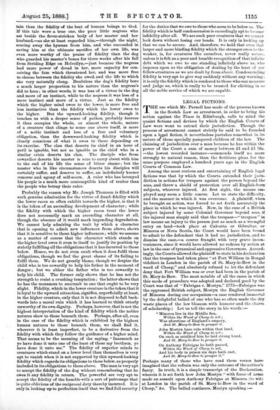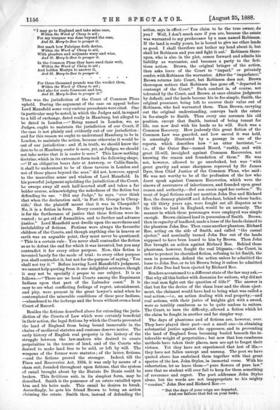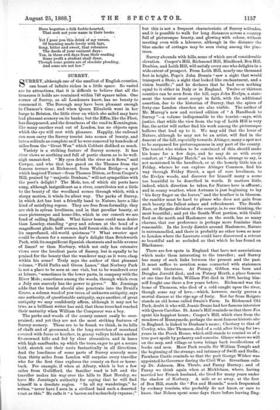LEGAL FICTIONS.
THE use which Mr. Parnell has made of the process known in the Scotch Law as arrestment, in order to bring his action against the Times in Edinburgh, calls to mind the quaint fictions and devices by which the English Courts of Law were wont to extend their jurisdiction. Though the process of arrestment cannot strictly be said to be founded upon a lcgal fiction, it nevertheless partakes somewhat in its nature of those specially pampered children of the law. The claiming of jurisdiction over a man because he has within the
power of the Court a sum of money between El and £1 10s. —the lowest recorded instance—commends itself no more strongly to natural reason, than the fictitious pleas for the same purpose employed a hundred years ago in the English Courts of Common Law.
Among the most curious and entertaining of English legal fictions was that by which the Courts extended their juris- diction in actions for trespass against the person beyond the seas, and threw a shield of protection over all English-born' subjects, wherever injured. At first sight, the means em.
ployed may seem a little coarse. Let us state the difficulty, and the manner in which it was overcome. A plaintiff, when he brought an action, was forced to set forth accurately the place in which he was injured. Now, in the case of a British subject injured by some Colonial Governor beyond seas, if the injured man simply said that the trespass—" trespass" in law means an injury to the person just as much as a wrongful entry on land—took place at Calcutta or Gibraltar, or Minorca or Nova Scotia, the Court would have been bound to admit to the defendant that it had no jurisdiction, and to dismiss the case,—a course fraught with very grave incon- veniences, since it would have allowed no redress by action at
law in the case of tyrannical and oppressive Governors. Accord- ingly, the Courts allowed the plaintiff to state in his declaration that the trespass had taken place "at Fort William in Bengal videlicet in London in the parish of St. Mary-le-Bow in the
ward of Cheap," and absolutely refused to let the defendant deny that Fort William was or ever had. been in the parish of St. Mary-le-Bow. The most notable of all the cases in which this mode of procedure was adopted and declared good by the Court was that of " Fabrigas v. Mostyn," 1773—Fabrigas was the oppressed British subject, Mostyn. the English Governor of Minorca during our occupation—a case rendered immortal by the delightful ballad of one who has so often made the dry waste places of the law blossom with humour and the charm of scholarship.) Let us tell the story in his words :—
" Arinorca lies in the Middle Sea, Within the Word of Cheap to wit ; Was aforetime of England's empery, And St. Mary-le-Bow to prosper it.
John Mostyn bare rule within that land, Within the Ward of Cheap to wit ; On such as misliked him he laid strong hand, And St. Mary-le-Bow to prosper it.
On Anthony Fabrigas he bath passed, Within the Ward of Cheap to wit,
And his body in prison six days hath east,
And St. Mary-le-Bow to prosper it."
Perhaps many of those who have read these verses hate imagined that the refrain was only the outcome of the author's fancy. In truth, it is a simple transcript of the Declaration,
wherein it is set forth how John Mostyn "with force of arms made an assault upon Anthony Fabrigas at Minorca (to wit)
at London in the parish of St. Mary-le-Bow in the ward of Cheap," &c. The ballad continues, Mostyn speaking :—
"I may go to England and take mine ease, Within the Ward of Cheap to wit ; For my trespass was done beyond the seas, And St. Mary-le-Bow to prosper it.
But mark how Fabrigas doth devise,
Within the Ward of Cheap to wit,
With pleaders and serjeants wary and wise,
And St. Mary-le-Bow to prosper it.
In the Common Pleas they have sued their writ,
Within the Ward of Cheap to wit ; And holden litostyn to answer it, And St. Mary-le-Bow to prosper it.
For three thousand pounds was the verdict then,
Within the Ward of Cheap to wit; And also for costs fourscore and ten, And St. Mary-le-Bow to prosper it."
Thus was the jurisdiction of the Court of Common Pleas upheld. During the argument of the case on appeal before Lord Mansfield some very curious precedents were cited. One 'in particular may be noted, in which the Judges said. in regard to a bill of exchange, dated really in Hamburg, but alleged to be dated in London :—‘‘ Being named in London, we, as Judges, ought to maintain the jurisdiction of our Court, if the case is not plainly and evidently out of our jurisdiction : and for this reason we ought to understand Hamburg to be in London, to maintain the action, because otherwise it would be out of our jurisdiction : and if, in truth, we should know the
date to be at Hamburg ouster is mere, yet, as Judges, we should not take notice that it is ouster is mere." This know-nothing
doctrineywhich in its extremest form took the following shape, —" If an obligation bears date at Antwerp, or Callis-Sands, it shall be understood to be of those taverns in London and not of those places beyond the seas," did not, however, appeal to the masculine sense and wisdom of Lord Mansfield. In his powerful judgment upholding the jurisdiction of the Court, ' he sweeps away all such half-hearted stuff and takes a far bolder course, acknowledging the nakedness of the fiction but defending its use. "Did any Judge," he says, "ever think that when the declaration said, in Fort St. George in Cheap- aide,' that the plaintiff meant that it was in Cheapside P No, it is a fiction in form. Every country has its forms. It is for the furtherance of justice that these fictions were in-
vented ; to get rid of formalities, and to further and advance -justice." Lord Mansfield next dwells upon the sacredness and -inviolability of fictions. Fictions were always the favourite children of the Courts, and though anything else in heaven or earth was an arguable point, they must never be questioned. " This is a certain rule: You never shall contradict the fiction
so as to defeat the end for which it was invented, but you may contradict it for every other purpose. Now, this fiction is invented barely for the mode of trial : to every other purpose
you shall contradict it, but not for the purpose of saying, You shall not try it." Before leaving Lord Mansfield's judgment, we cannot help quoting from it one delightful sentence, though it may not be specially a propos to our subject. It is as
follows :—" There are no local Courts among the Esquimaux Indians upon that part of the Labrador coast." It is easy to see what conflicting feelings of regret, astonishment, and pity, were present in the great lawyer's mind when he contemplated the miserable conditions of these poor Indians, —abandoned to the icebergs and the bears without even a local 'Court of Record.
Besides the fictions described above for extending the juris- diction Of the Courts of Law which were certainly beneficial in their action, the legal fictions by which the Courts prevented the land of England from being bound immovable in the chains of mediteval statutes and customs deserve notice. The early history of English real property is the history of the struggle between the law-makers who desired to create perpetuities in the tenure of land, and of the Courts who desired to make land free to be sold, or left by will. The weapons of the former were statutes ; of the latter, fictions, —and the fictions proved the stronger. Indeed, till the Fines and Recoveries Act, 1834, it was only by means of a sham suit, founded throughout upon fictions, that the system of entail brought about by the Statute De Donis could be broken. This fictitious suit, in its simplest form, may be described. Smith is the possessor of an estate entailed upon
him and his heirs male. This entail he desires to break. Accordingly, he gets his friend Brown to bring an action claiming the estate. Smith then, instead of defending the
action, says in effect You claim to be the true owner, do
you ? Well, I don't much care if you are, because the estate was warranted to my predecessor by a man named Robinson. If the land is really yours, he is bound to give me other lands as good. I shall therefore not bother my head about it, but shall let Robinson and you and fight it out.' Robinson there- upon, who is also in the plot, comes forward• and admits his liability as warrantor, and becomes a party to the, ficti- tious action. Brown, the original bringer of the action, then asks leave of the Court to " imparl," or privately confer, with Robinson the warrantor. After the " imparlance," Brown returns into Court, but Robinson does not. Brown thereupon notices that Robinson has gone off, "departed in contempt of the Court." Such conduct is, of course, not tolerated by the Court, and Brown at once obtains judgment by default, and the lands become his in fee-simple, Smith, the original possessor, being left to recover their value out of Robinson, who had warranted them. Then Brown, carrying out the original understanding, conveys back the estate in fee-simple to Smith. Thus every one assumes his old position, except that Smith, instead of being tenant for life, can now deal with his lands as he will. Such was a Common Recovery. How jealously this great fiction of the Common Law was guarded, and how sacred it was held, is amusingly illustrated by a passage in one of the reports, which describes how " an utter banister, "- i.e., of the Outer Bar—named Hoord, "rashly, and with great ill-will, inveighed against Common Recoveries, not knowing the reason and foundation of them." He was not, however, allowed to go nnrebuked, but was "with great gravity and some sharpness reproved by Sir James Dyer, then Chief Justice of the Common Pleas, who said : He was not worthy to be of the profession of the law who durst speak against Common Recoveries, which were the sinews of assurances of inheritances, and founded upon great reason and authority,—Sed non amnia capit hoc verbum." To treat of legal fictions and not mention John Doe and Richard Roe, the dummy plaintiff and defendant, behind whose backs, up till thirty years ago, were fought out all disputes as to the titles to land in England, would be an anomaly. The manner in which these personages were employed was simple enough. Brown claimed land in possession of Smith. Brown, then in capacity of landlord, made a lease of the lands claimed to the phantom John Doe. Then came another phantom, Richard Roe, acting on the side of Smith, and called "the casual ejector," and nominally turned John Doe out of the lands supposed to have been leased to him by Brown. Then John Doe brought an action against Richard Roe. Behind these phantoms, however, fought the real litigants,—the Courts in order to protect its cherished fiction, refusing to let Smith, the man in possession, defend the action unless he admitied the lease to John Doe, or to let Brown bring it unless he admitted that John Doe had been ejected by Richard Roe.
Readers accustomed to a different state of the law may ask,— ' But why all this bother with dummies for suitors; why did not the real men fight out the question of title ?' The answer is that but for the device of the sham lease and the sham eject- ment, the claimant would have had to bring what was called a real action,—i.e., an action dealing with real property,—and real actions, with their juries of knights girt with a sword, were so terribly cumbrous as to be quite useless to suitors. The Court, to turn the difficulty, allowed a fiction which let the claim be fought in another and far simpler way.
The days of phantoms and of fictions are, however, over. They have played their part—not a small one—in obtaining substantial justice against the oppressor, and in preventing the land of England from becoming buried beneath the in- tolerable weight of perpetuities ; but now that less cumbrous methods have taken their places, men are apt to forget their virtues. Yet they have not experienced that last of 'ills,— they have not fallen unwept and unsung. The poet we have quoted above has enshrined them together with that great spectre of the law, John Styles, in immortal verse. With his exhortation, let us leave them—" pure flowers of pure law," sure that no student will ever fail to keep for them something of reverence and regret. The poet addresses John Styles alone, but the words are not inappropriate to his mighty "cousins," John Doe and Richard Roe :—
"But the days of your reign are departed. And our fathers that fed on your looks, Have begotten a folk feeble-hearted;
That seek not your name in their books.
Yet I pour you this drink of my verses, Of learning made lovely with lays, Song, bitter and sweet, that rehearses The deeds of your eminent days : Yea, in these evil days from their reading Some profit a student shall draw, Though some points are of obsolete pleading.
And some are not law."




































 Previous page
Previous page